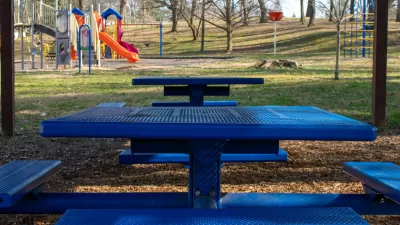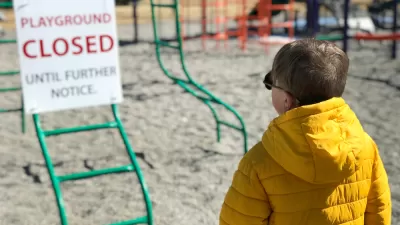Unstructured play is a mainstay of childhood. But dense urban areas offer fewer opportunities for free-form playtime, writes Alex Marshall. Kids have to take what they can get, and often it's not much more than an empty parking lot.
"[T]here is a difference between a playground and a street corner. For one thing, playgrounds, with their single gate, always-latched entries and jungle gyms with rubber floors, have become cage-like and womb-like in their protectivity of children from both potential intruders and scraped knees. You have to look elsewhere for truly unstructured play.
As luck would have it, my wife and I live in a converted warehouse that has some low-income housing built across from it, fronting on a barren asphalt parking lot. There are children playing in this parking lot often, virtually all of them coming from the low-income housing. These kids, ages two to 15 or so, play in a self-governing universe, without parents. By design or default, unstructured play has become the domain of the less affluent.
Lately we've been throwing our four-and-a-half year old son Max into this universe, with delightful results."
FULL STORY: Spotlight Vol. 8, No. 14: Playing in The Streets

Planetizen Federal Action Tracker
A weekly monitor of how Trump’s orders and actions are impacting planners and planning in America.

Maui's Vacation Rental Debate Turns Ugly
Verbal attacks, misinformation campaigns and fistfights plague a high-stakes debate to convert thousands of vacation rentals into long-term housing.

Restaurant Patios Were a Pandemic Win — Why Were They so Hard to Keep?
Social distancing requirements and changes in travel patterns prompted cities to pilot new uses for street and sidewalk space. Then it got complicated.

In California Battle of Housing vs. Environment, Housing Just Won
A new state law significantly limits the power of CEQA, an environmental review law that served as a powerful tool for blocking new development.

Boulder Eliminates Parking Minimums Citywide
Officials estimate the cost of building a single underground parking space at up to $100,000.

Orange County, Florida Adopts Largest US “Sprawl Repair” Code
The ‘Orange Code’ seeks to rectify decades of sprawl-inducing, car-oriented development.
Urban Design for Planners 1: Software Tools
This six-course series explores essential urban design concepts using open source software and equips planners with the tools they need to participate fully in the urban design process.
Planning for Universal Design
Learn the tools for implementing Universal Design in planning regulations.
Heyer Gruel & Associates PA
JM Goldson LLC
Custer County Colorado
City of Camden Redevelopment Agency
City of Astoria
Transportation Research & Education Center (TREC) at Portland State University
Jefferson Parish Government
Camden Redevelopment Agency
City of Claremont





























